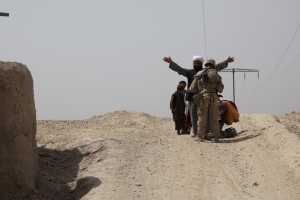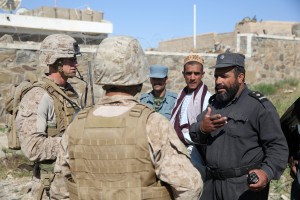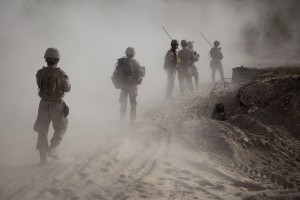
CAMP LEATHERNECK, Afghanistan – As the majority of Camp Leatherneck’s residents were still asleep one typical Thursday morning, infantrymen with Weapons Company, 1st Battalion, 7th Marine Regiment, reinforced with Afghan commandos, prepared to depart friendly lines, April 17.
Their two-day mission was to disrupt lethal enemy aid and to search three compounds of interest in an area suspected of Taliban influence. The compounds were suspected to contain a homemade-explosive lab, a cache for narcotics and be home to local Taliban leadership.
As the company convoy departed friendly lines in the darkness, they made their way to the Washir District center to link up with Afghan National Army soldiers. After hours of driving on seldom used routes to avoid improvised explosive devices, the company arrived at the district center, where Weapons Company Commander Capt. Scott Stewart and an interpreter met with senior ANA officers and received intelligence about the three compounds of interest.
“Our goal was to gather any last-minute information that might help us with our mission,” said 1st Lt. Andrew Darlington, a platoon commander with Weapons Co. and a native of New Orleans. “We also wanted to check on the Afghan soldiers to make sure they were ok and to see if they needed anything from us.”

While the Marines waited to head out to their next objective, they repaired the damaged gear and weapons systems belonging to the Afghan soldiers aboard the post. Gunnery Sgt. Gerald Furnari, a platoon sergeant with Weapons Co. and a native of Franklin Square, N.Y., gave Afghan soldiers a class on proper maintenance and usage of the M2 .50-caliber machine gun. With the security responsibility of the surrounding area steadily becoming the responsibility of the Afghan National Army, the Marines advised them as much as possible before departing the post.
“I think by us going up there to disrupt the enemy and create a little bit more of a buffer for the Afghan National Security Forces, it won’t be as challenging for them once we leave,” said Staff Sgt. Joshua Brodrick, a platoon sergeant with Weapons Co. and a native of Huntington, Ind.
From the Washir District center, the company continued to the small village of Duzno. The Marines spoke with locals and the village elder to gather further intelligence about Payawak, the city containing the three compounds of interest. The sun began its descent and it was time for the Marines to proceed toward the compounds.

As the convoy began to approach the city, aerial observation reported dozens of the city dwellers fleeing the area. When the company arrived, Payawak was nearly vacant. Led by the Afghan commandos, the Marines dismounted and continued on foot into the vegetation surrounding the compounds.
The area was disturbingly quiet; only livestock and the rustle of wind blowing through foliage could be heard as they maneuvered through waist-high poppy fields. The vegetation was thick enough in areas where an improvised explosive device a footstep away could easily remain unnoticed. Small holes in mud walls could erupt with enemy gunfire at any moment. The Marines proceeded forward with caution as beads of sweat began to run down their faces.
The commandos moved to enter and clear the three compounds as Marines provided security. Traces of ammonium nitrate, a common chemical found in IEDs, were found along with two antipersonnel mines. Fortunately, no one was injured during the discovery.
After the mines were properly destroyed and the Marines gathered the intelligence they needed on each of the compounds, they returned to their vehicles to assume overwatch positions. The infantrymen manned machine guns, grenade launchers and monitored cameras throughout the night to watch for suspicious activity in the surrounding area.
The area remained tranquil, and the company departed the area shortly after sunrise. The convoy continued to stay vigilant and alert during their return to Camp Leatherneck and arrived safely with each Marine unharmed.
“We proved to the enemy that we can reach out to any area in Helmand province,” Darlington said. “Our mission let the enemy know that no area is safe for them.”
[poll random]









